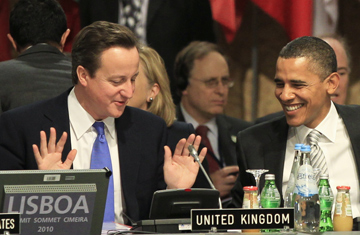
British Prime Minister David Cameron, left, speaks with U.S. President Barack Obama during the second day of the NATO summit in Lisbon, on Nov. 20, 2010
Britain's chattering classes are gripped by a story of love between unequal partners and the difficulties in sustaining that love over time. These concerns are expected to reach fever pitch this coming spring, when Kate Middleton marries Prince William. The question every Briton wants to know the answer to, however, is not whether commoner Kate can cope with her posh new in-laws; it's whether President Obama will bother to turn up for the nuptials.
Yes, once again Britain is worrying about its "special relationship" with the U.S. — and with good cause. The diplomatic cables revealed by WikiLeaks on Saturday lay bare U.S. irritation at Britain's eternal insecurity over its importance to Washington and the constant quest for reassurance from U.S. contacts in diplomatic and political circles that this entails. The neurotic behavior of the Brits, together with serial British media storms over perceived slights by Washington, "would be humorous if [they] were not so corrosive," wrote Richard LeBaron, the genial and long-serving deputy chief of mission at the U.S. embassy in London, in one dispatch dated February 2009. He gave an example of what he called London's "over-reading" of the signals from Washington: "Much was made in the British press — and even by serious [government] officials — of the 'fact' that [Obama's] inauguration speech mentioned the U.K. only in the context of the British 'enemy' harrying George Washington's troops."
It's powerfully reminiscent of one of those dysfunctional marriages in which the clingy spouse eventually brings about the result he or she most fears: driving the loved one away. Small wonder that David Cameron, on the eve of his first prime ministerial visit to the U.S. in July, told TIME, "We should always be conscious of the fact that we're the junior partner in this relationship and America is a Pacific power as well as an Atlantic power. I think that we should deal with things as they are rather than trying to be too needy."
Cameron's attempt at gentle recalibration of the relationship — and his use of the phrase "junior partner" — provoked yet more angst in Britain. Critics said he was simultaneously talking down his own country and denigrating the importance of its closeness to Washington. As the WikiLeaks cache shows, there was no cause for concern on the second point. Long before Cameron came to power, in May 2010, his attempts to get a healthy perspective on the relationship with Washington were being undermined as his Shadow Foreign Secretary William Hague and Shadow Defense Secretary Liam Fox made cow eyes at the U.S. In April 2008, Hague told LeBaron that Washington had no reason to worry if Cameron's Conservatives came to power. "Hague asserted that he, Cameron and Shadow Chancellor George Osborne are all 'children of Thatcher' and staunch Atlanticists," noted LeBaron after the meeting. Hague promised a "pro-American" government. According to another cable, sent in December 2009, Fox went so far as to promise "a much more pro-America profile in procurement."
It's all horribly familiar to anyone who has followed the nations' troubled romance for more than a few years. When Cameron's predecessor Gordon Brown entered a Downing Street still warm from its previous resident, his rival and Labour colleague Tony Blair, one of his first tasks was to redefine what was meant by the special relationship. Blair's closeness to President George W. Bush — and their joint adventurings in Afghanistan and especially Iraq — had eroded public support for the relationship. Brown is a huge fan of the U.S. — "I love the States," he told TIME in 2008, adding, "America is still a beacon to the world for its defense of liberty and support for individual opportunity" — yet his dour public persona betrayed him, quickly convincing his fellow Brits that relations with Washington were not as close as in Blair's day. Were those Brits happy to see a little more distance in the relationship? Not at all. They began agonizing all over again, about the U.S. getting too close to Nicolas Sarkozy of France or playing footsie with Angela Merkel of Germany. They wondered if the U.S. really cared about Britain at all.
The answer, of course, also laid bare in the WikiLeaks trove of cables, is that the U.S. does care, but not as much as Britain. Many of the U.S.'s so-called snubs to the British arise from the low profile that many British politicians, even premiers, suffer stateside. A former British government official working in Washington reacted with amusement to the sight of his compatriots going into overdrive in preparation for one of Brown's visits to the U.S. capital. "It reminds me of when John Major replaced Margaret Thatcher [as U.K. Prime Minister, in 1990]," the official told TIME. "Americans thought he was some kind of military figure. They kept asking, 'Major who?' "
That doesn't mean the special relationship is bound for the rocks. The most recent release of classified information from WikiLeaks includes a list of facilities vital to U.S. security. A significant number of these, such as satellite communications sites and points of landfall for transatlantic cables, are located in the U.K. — tangible evidence that the relationship is not as one-sided as British fears suggest. Indeed, the ties that bind the two countries beneath the surface flummery of photo ops and public displays of affection are physical, strategic, political, military, commercial, cultural and even sentimental, more than enough to sustain a long, if open, marriage. If Obama doesn't come to London for the royal wedding — and sources suggest he may not — this shouldn't call into question his belief in the marriage, either marriage. But you can be sure anxious Britons won't see it that way.
